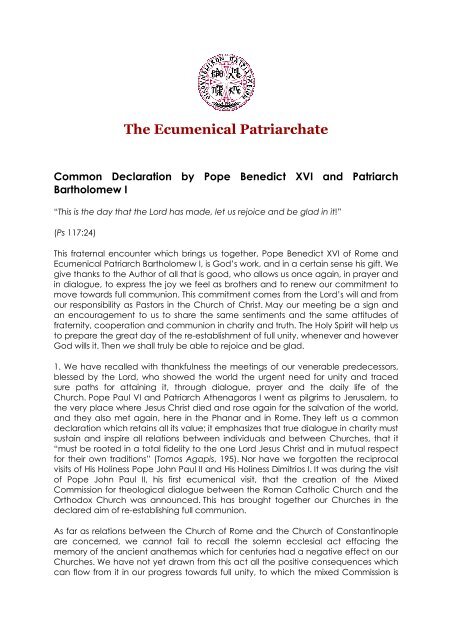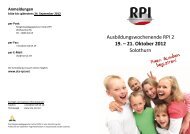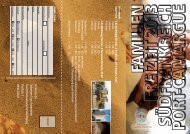Common Declaration by Pope Benedict XVI and Patriarch and ...
Common Declaration by Pope Benedict XVI and Patriarch and ...
Common Declaration by Pope Benedict XVI and Patriarch and ...
You also want an ePaper? Increase the reach of your titles
YUMPU automatically turns print PDFs into web optimized ePapers that Google loves.
The Ecumenical <strong>Patriarch</strong>ate<strong>Common</strong> <strong>Declaration</strong> <strong>by</strong> <strong>Pope</strong> <strong>Benedict</strong> <strong>XVI</strong> <strong>and</strong> <strong>Patriarch</strong>Bartholomew I“This is the day that the Lord has made, let us rejoice <strong>and</strong> be glad in it!”(Ps 117:24)This fraternal encounter which brings us together, <strong>Pope</strong> <strong>Benedict</strong> <strong>XVI</strong> of Rome <strong>and</strong>Ecumenical <strong>Patriarch</strong> Bartholomew I, is God’s work, <strong>and</strong> in a certain sense his gift. Wegive thanks to the Author of all that is good, who allows us once again, in prayer <strong>and</strong>in dialogue, to express the joy we feel as brothers <strong>and</strong> to renew our commitment tomove towards full communion. This commitment comes from the Lord’s will <strong>and</strong> fromour responsibility as Pastors in the Church of Christ. May our meeting be a sign <strong>and</strong>an encouragement to us to share the same sentiments <strong>and</strong> the same attitudes offraternity, cooperation <strong>and</strong> communion in charity <strong>and</strong> truth. The Holy Spirit will help usto prepare the great day of the re-establishment of full unity, whenever <strong>and</strong> howeverGod wills it. Then we shall truly be able to rejoice <strong>and</strong> be glad.1. We have recalled with thankfulness the meetings of our venerable predecessors,blessed <strong>by</strong> the Lord, who showed the world the urgent need for unity <strong>and</strong> tracedsure paths for attaining it, through dialogue, prayer <strong>and</strong> the daily life of theChurch. <strong>Pope</strong> Paul VI <strong>and</strong> <strong>Patriarch</strong> Athenagoras I went as pilgrims to Jerusalem, tothe very place where Jesus Christ died <strong>and</strong> rose again for the salvation of the world,<strong>and</strong> they also met again, here in the Phanar <strong>and</strong> in Rome. They left us a commondeclaration which retains all its value; it emphasizes that true dialogue in charity mustsustain <strong>and</strong> inspire all relations between individuals <strong>and</strong> between Churches, that it“must be rooted in a total fidelity to the one Lord Jesus Christ <strong>and</strong> in mutual respectfor their own traditions” (Tomos Agapis, 195). Nor have we forgotten the reciprocalvisits of His Holiness <strong>Pope</strong> John Paul II <strong>and</strong> His Holiness Dimitrios I. It was during the visitof <strong>Pope</strong> John Paul II, his first ecumenical visit, that the creation of the MixedCommission for theological dialogue between the Roman Catholic Church <strong>and</strong> theOrthodox Church was announced. This has brought together our Churches in thedeclared aim of re-establishing full communion.As far as relations between the Church of Rome <strong>and</strong> the Church of Constantinopleare concerned, we cannot fail to recall the solemn ecclesial act effacing thememory of the ancient anathemas which for centuries had a negative effect on ourChurches. We have not yet drawn from this act all the positive consequences whichcan flow from it in our progress towards full unity, to which the mixed Commission is
called to make an important contribution. We exhort our faithful to take an activepart in this process, through prayer <strong>and</strong> through significant gestures.2. At the time of the plenary session of the mixed Commission for theologicaldialogue, which was recently held in Belgrade through the generous hospitality ofthe Serbian Orthodox Church, we expressed our profound joy at the resumption ofthe theological dialogue. This had been interrupted for several years because ofvarious difficulties, but now the Commission was able to work afresh in a spirit offriendship <strong>and</strong> cooperation. In treating the topic “Conciliarity <strong>and</strong> Authority in theChurch” at local, regional <strong>and</strong> universal levels, the Commission undertook a phase ofstudy on the ecclesiological <strong>and</strong> canonical consequences of the sacramentalnature of the Church. This will permit us to address some of the principal questionsthat are still unresolved. We are committed to offer unceasing support, as in the past,to the work entrusted to this Commission <strong>and</strong> we accompany its members with ourprayers.3. As Pastors, we have first of all reflected on the mission to proclaim the Gospel intoday’s world. This mission, “Go, make disciples of all nations” (Mt 28:19), is todaymore timely <strong>and</strong> necessary than ever, even in traditionally Christiancountries. Moreover, we cannot ignore the increase of secularization, relativism,even nihilism, especially in the Western world. All this calls for a renewed <strong>and</strong>powerful proclamation of the Gospel, adapted to the cultures of our time. Ourtraditions represent for us a patrimony which must be continually shared, proposed,<strong>and</strong> interpreted anew. This is why we must strengthen our cooperation <strong>and</strong> ourcommon witness before the world.4. We have viewed positively the process that has led to the formation of theEuropean Union. Those engaged in this great project shouldnot fail to take intoconsideration all aspects affecting the inalienable rights of the human person,especially religious freedom, a witness <strong>and</strong> guarantor of respect for all otherfreedoms. In every step towards unification, minorities must be protected, with theircultural traditions <strong>and</strong> the distinguishing features of their religion. In Europe, whileremaining open to other religions <strong>and</strong> to their cultural contributions, we must uniteour efforts to preserve Christian roots, traditions <strong>and</strong> values, to ensure respect forhistory, <strong>and</strong> thus to contribute to the European culture of the future <strong>and</strong> to thequality of human relations at every level. In this context, how could we not evoke thevery ancient witnesses <strong>and</strong> the illustrious Christian heritage of the l<strong>and</strong> in which ourmeeting is taking place, beginning with what the Acts of the Apostles tells usconcerning the figure of Saint Paul, Apostle of the Gentiles? In this l<strong>and</strong>, the Gospelmessage <strong>and</strong> the ancient cultural tradition met. This link, which has contributed somuch to the Christian heritage that we share, remains timely <strong>and</strong> will bear more fruitin the future for evangelization <strong>and</strong> for our unity.5. Our concern extends to those parts of today’s world where Christians live <strong>and</strong> tothe difficulties they have to face, particularly poverty, wars <strong>and</strong> terrorism, but equallyto various forms of exploitation of the poor, of migrants, women <strong>and</strong> children. We arecalled to work together to promote respect for the rights of every human being,created in the image <strong>and</strong> likeness of God, <strong>and</strong> to foster economic, social <strong>and</strong>cultural development. Our theological <strong>and</strong> ethical traditions can offer a solid basisfor a united approach in preaching <strong>and</strong> action. Above all, we wish to affirm thatkilling innocent people in God’s name is an offence against him <strong>and</strong> against human








